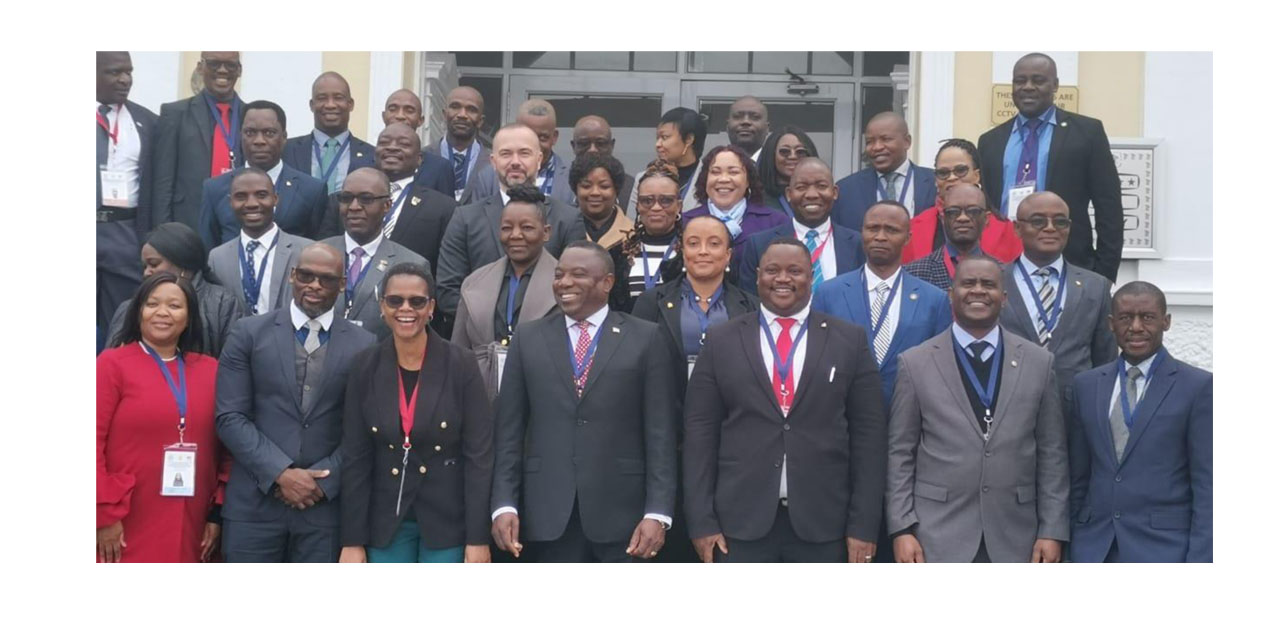Niël Terblanché
Various heads of Interpol’s National Central Bureaus (NCB) of southern Africa gathered in Swakopmund to share their knowledge and experience in combating all forms of transnational organised crime in the Southern African Development Community
During the official opening of the meeting the head of Interpol’s Regional Bureau in Harare, Sello Moerane, said the meeting represents a unique opportunity for senior police officers to come together as a community of law enforcement professionals from different countries, cultures, and backgrounds, and to share our knowledge and expertise in the fight against organised crime.
“As we face an ever-evolving crime threat landscape, it is fundamental that we work together to address the challenges we face as a region. This meeting provides a vital platform for us to exchange information, discuss best practices, and collaborate on joint initiatives to enhance our collective efforts in combating crime and ensuring the safety and security of our respective nations,” Moerane said.
Major General Elias Mutota, the Deputy Inspector General of Operations, on behalf of the Inspector General of the Namibian Police, Lieutenant General Joseph Shikongo, officially opened the meeting and said that it is undeniable that the environment in which officers are operating, is filled with instability, uncertainties, and complexities and heightened activity of criminal syndicates.
“While this is an undeniable reality, progressive institutions need to rise above these challenges and confront them head-on,” he said.
The general said that all Interpol member countries should at all times be cognisant of the fact that their governments are contributing annual fees and can only realize the full value of the organisation once they start ensuring maximum utilization of digital tools to fight against transnational organized crime.
He said National Central Bureaus are the nerve centres of Interpol that strengthen international police cooperation.
“We must stay within our objective of enhanced collaboration and provide sufficient technical assistance to all Law Enforcement Agencies in the region and beyond to improve the quality of services we provide to our stakeholders. I call upon you to fully utilize this opportunity to examine the Draft Regional Strategy on the expansion of l-24/7 beyond NCBs.
He said the regional strategy is an essential roadmap that will go a long way in ensuring the region’s capacity to exploit contemporary digital tools in combating transnational organized crime.
“In addition, the strategy shall further intensify awareness of Interpol’s activities, services and databases in fighting global illicit criminal threats,” General Mutota said.
He reminded attendees that they play a pivotal role in the contribution of national crime data to Interpol’s databases and that it is an essential element that ensures that accurate data is in the right place at the right time which allows various police forces to identify trends, prevent crimes and arrest criminals.
General Mutota said the threat posed by domestic or international terrorism within Southern Africa has remained relatively low compared to other regions.
“Patterns have, however, been shifting, as demonstrated by the unprecedented incidents of insurgency activities in Cabo Delgado in Northern Mozambique. The exchange of operational information is essential to tackling terrorism while at the same time conducting lawful investigations,” he said.
According to General Mutota, police forces across the globe must share more Counter Terrorism (CT) information and intelligence with Interpol to enable the organisation to give a global threat picture of this scourge.
He said crimes against children continue to be of grave concern to all police officers and that most of the Member States established special units to deal with cases related to vulnerable persons including children that there are certain requirements needed in order to be accredited in the International Child Sexual Exploitation (ICSE) Image Database.
“We should strongly work towards meeting these requirements if we are to effectively curb this worrisome scourge,” he said.
According to General Mutota, the African Joint Operation Against Cybercrime (AFJOC) Project which was established in 2021 should be recognized as an instrument in the fight against emerging crimes in the region and the world,
“We need to thoroughly examine its footprints and impact in the region since its inception,” he said.
The general pointed out that Project ENACT is one of Interpol’s tools which has existed for quite a while and the end users should confirm whether it is making a meaningful impact on policing efforts in the region.
“I wish to challenge you all to take advantage of this very important platform to explore various criminal threats impacting our region and craft strong strategies that will enable us to outpace and suffocate criminal enterprises and syndicates,” he urged delegates.




